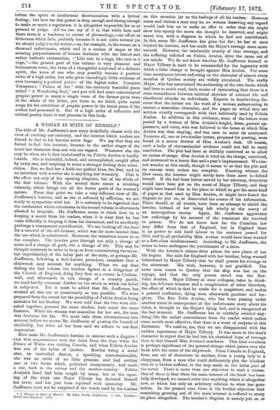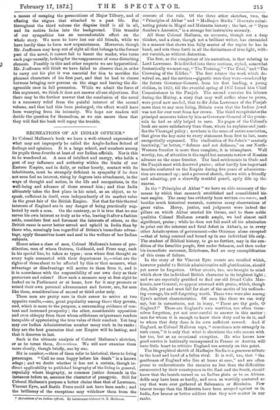A WOMAN IN SPITE OF HERSELF.*
The title of Mr. Jeaffreson's new story is skilfully chosen with the 'view of exciting our curiosity, and the interest which readers are forced to feel in his heroine never flags. We say that they are 'forced to feel this interest, because in the earlier stages of the was feminine for his. We must take these circumstances into account before we accuse Mr. Jeaffreson of passing the bounds of -credibility, bnt when all has been said we adhere to our first impression. How came Mr. Jeaffreson's heroine to assume such a disguise ? 'Our first acquaintance with her data; from the time when the ,Prince of Wales was visiting Canada, and when Felicia Avalon was one of the belles of Quebec. Besides being a social -star, an unrivalled dancer, a sparkling conversationalist, -she was an artist of no little promise, and had written -one or two books which, published anonymously, had made -a stir, both in the colony and the mother-country. Felicia _Avalon's hand had been sought by many, but at the open- ing of the story one Major Tilbury has declared himself -her lover, and has just been repulsed with ignominy. Mr. .Jeaffreson must not be surprised if the words used by his heroine • d Woman in Spite of Herself. By John Cordy Jeaffreson. 3 vole. London: Hunt and Blackett. 1872. on this occasion jar on the feelings of all his readers. However mean and vicious a man may be, no woman deserving any regard would lead him on to make an offer in order that she might show him openly the scorn she thought he deserved, and might taunt him with a disgrace to which he bad not contributed. in this scene Mr. Jeaffreson has gone 'too far ; he has at once injured his heroine, and has made the Major's revenge seem more natural. However, the intolerable cruelty of that revenge, and the suffering inflicted on Felicia Avalon, drive the cause out of our minds. We do not know whether Mr. Jeaffreson himself or Major Tilbury is most to be commended for the ingenuity with which a false charge is brought against Miss Avalon. For some time anonymous letters reflecting on the character of almost every member of Quebec society are widely circulated. The crafty Major, who has ascertained the authorship of the two books which had been so much read, finds means of insinuating that there is a close resemblance between satirical sketches of colonial life and slanderous attacks on individuals. Experts in handwriting dis- cover that the letters are the work of a woman endeavouring to assume a masculine character, and the paper on which they are written exactly corresponds with that habitually used by Felicia Avalon. In addition to this evidence, some of the letters were posted by a woman of Miss Avalou's height, dress, general ap- pearance, and voice, who was followed to the house at which Miss Avalon was then staying, and was seen to enter its courtyard. To crown all, one or two similar letters, prepared for posting, were found in a secret drawer of Miss Avalon's desk. Of course, such a body of circumstantial evidence could not fail to carry conviction. The plot had been so skilfully contrived as to allow no means of escape. Miss Avalon is tried on the charge, convicted, and sentenced to a heavy fine and a year's imprisonment. We can- not wonder at this result, though it seems to us that the plot and its success were rather too complete. Knowing whence the blow came, the heroine might surely have done more to defend herself. If she had been better served by her attorney, detectives would have been put on the scent of Major Tilbury, and they might have traced him to the place at which he got the same kind of paper as that used by Miss Avalon, or might have found the disguise he put on, or discovered the source of his information. There should, at all events, have been an attempt to shield the heroine, instead of her being left wholly at the mercy of an • unscrupulous enemy. Again, Mr. Jeaffreson aggravates her sufferings by his account of the treatment she received in prison. We do not know how far the Canadian law may differ from that of England, but in England there is no power to add hard labour to the sentence passed for libel, and in all probability Miss Avalon would have been treated as a first-class misdemeanant. According to Mr. Jeaffreson, she seems to have undergone the punishment of a felon. With the heroine's release from prison the new phase of her life begins. She sails for England with her brother, being warned beforehand by Major Tilbury that he shall pursue his revenge to the uttermost. His wish, however, is not gratified. The news soon comes to Quebec that the ship was lost on the voyage, and that the only person saved was the Rev. Felix Avalon. Major Tilbury at once collapses, takes to drink- ing, has delirium tremens and a complication of other disorders, the effect of which is that he sends for a magistrate and makes a general confession, dying soon afterwards penitent and for- given. The Rev. Felix Avalon, who has been passing under another name in consequence of the unfortunate story about his sister, is brought to the Major's dying bed, and is recognized at the last moment. Mr. Jeaffreson has so carefully avoided any- thing like the unfair concealment from the reader which makes some novels most effective, that there is a want of surprise at this disclosure. We confess, too, that we are disappointed with the sudden repentance of Major Tilbury. It was more in the man's character to regret that he had lost his cherished hope of revenge than to feel himself Miss Avalon's murderer. This total revulsion is perhaps significant of the general change which passes over the book with the scene of the shipwreck. From Canada to England, from one set of characters to another, from a young lady to a clergyman, from a man who could deliberately plot the blackest ruin to a broken sufferer, is the step made in the latter part of the novel. There is more than one objection to such a course. One of these is that when the main interest of the book has been fully developed, we cannot enter into anything which is altogether new, or which has only an arbitrary relation to what has gone before. In the present case there is the further objection that something growing out of the main interest is suffered to usurp its place altogether. The heroine's disguise is merely put on as a means of escaping the persecutions of Major Tilbury, and of effacing the stigma that attached to a past life. But throughout the third volume the disguise itself is all in all, and its motive fades into the background. This transfer of our sympathies has an uncomfortable effect on the whole story. We seem to have lost our old friends, while we have hardly time to form new acquaintances. Moreover, though Mr. Jea.ffreson may keep out of sight all that belongs to the former part of the novel, it cannot fail to haunt the reader, who turns each page uneasily, looking for the reappearance of some disturbing element. Possibly in this and other respects we are hypercritical. Mr. Jeaffreson will think we have failed to observe that,in order to carry out his plot it was essential for him to sacrifice the pleasant characters of his first part, and that he had to choose between bringing new persons on the stage and leaving the dis- agreeable ones in full possession. While we admit the force of this argument, we think it does not answer all our objections. But there may be the further answer that the conclusion of the novel is a necessary relief from the painful interest of the second volume, and that had this been prolonged, the effect would have been wearying from its intensity. We hope our readers will decide the question for themselves, as we can assure them that they will find the book well repay the trouble.



































 Previous page
Previous page